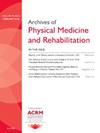运动对脊髓损伤成人心理健康和健康相关生活质量的影响:系统回顾与元分析》。
IF 3.6
2区 医学
Q1 REHABILITATION
Archives of physical medicine and rehabilitation
Pub Date : 2024-12-01
DOI:10.1016/j.apmr.2024.02.737
引用次数: 0
摘要
目标:确定运动干预对 SCI 患者心理健康和健康相关生活质量(HRQoL)的影响:确定运动干预对 SCI 患者心理健康和健康相关生活质量 (HRQoL) 的影响:我们检索了从开始到 2023 年 9 月的 Embase、CINAHL、Medline、PsychINFO 和 SPORTDiscus:我们纳入了以下随机对照试验1)涉及年龄大于 18 岁的 SCI 患者;2)实施了运动干预;3)测量了主观幸福感、心理幸福感、社会幸福感和/或 HRQoL 作为结果。我们报告了带有 95% 置信区间 (CI) 的标准化均值差异 (d),使用修订版 Cochrane 随机试验偏倚风险工具 (RoB 2) 评估了偏倚风险,并使用 GRADE 评估了证据的确定性:共纳入 19 项研究(797 名参与者,每项研究的平均年龄均小于 65 岁)。运动改善了总体幸福感(d = 0.494; 95% CI 0.268, 0.720; 低确定性证据)、主观幸福感(d = 0.543; 95% CI 0.270, 0.816; 低确定性证据)、心理幸福感(d = 0.499;95% CI 0.193,0.805;低确定性证据)、社会福利(d = 0.452;95% CI 0.151,0.752;低确定性证据)和 HRQoL(d = 0.323;95% CI 0.072,0.574;低确定性证据)。三项研究报告了四起可能与干预措施有关的严重不良事件:运动干预可改善患有 SCI 的成年人的福祉和 HRQoL本文章由计算机程序翻译,如有差异,请以英文原文为准。
Effect of Exercise on Mental Health and Health-related Quality of Life in Adults With Spinal Cord Injury: A Systematic Review and Meta-analysis
Objectives
To determine the effect of exercise interventions on mental health and health-related quality of life (HRQoL) in individuals with SCI.
Data Sources
We searched Embase, CINAHL, Medline, PsychINFO, and SPORTDiscus from inception to September 2023.
Study Selection
We included randomized controlled trials that (1) involved participants ≥18 years old with a SCI; (2) administered an exercise intervention; and (3) measured subjective well-being, psychological well-being, social well-being, and/or HRQoL as outcomes. We reported standardized means differences (d) with a 95% confidence interval (CI), assessed the risk of bias by using the Revised Cochrane Risk-of-bias Tool for Randomized Trials (RoB 2), and the certainty of the evidence using GRADE.
Data Synthesis
Nineteen studies (797 participants, mean age <65 years in every study) were included. Exercise improved overall well-being (d=0.494; 95% CI 0.268, 0.720; low certainty evidence), subjective well-being (d=0.543; 95% CI 0.270, 0.816; low certainty evidence), psychological well-being (d=0.499; 95% CI 0.193, 0.805; low certainty evidence), social well-being (d=0.452; 95% CI 0.151, 0.752; low certainty evidence), and HRQoL (d=0.323; 95% CI 0.072, 0.574; low certainty evidence). Four serious adverse events probably attributable to the interventions were reported in 3 studies.
Conclusions
Exercise interventions can improve well-being and HRQoL in adults with SCI <65 years of age. Additional research is needed to determine effectiveness in adults ≥65 years of age.
求助全文
通过发布文献求助,成功后即可免费获取论文全文。
去求助
来源期刊
CiteScore
6.20
自引率
4.70%
发文量
495
审稿时长
38 days
期刊介绍:
The Archives of Physical Medicine and Rehabilitation publishes original, peer-reviewed research and clinical reports on important trends and developments in physical medicine and rehabilitation and related fields. This international journal brings researchers and clinicians authoritative information on the therapeutic utilization of physical, behavioral and pharmaceutical agents in providing comprehensive care for individuals with chronic illness and disabilities.
Archives began publication in 1920, publishes monthly, and is the official journal of the American Congress of Rehabilitation Medicine. Its papers are cited more often than any other rehabilitation journal.

 求助内容:
求助内容: 应助结果提醒方式:
应助结果提醒方式:


